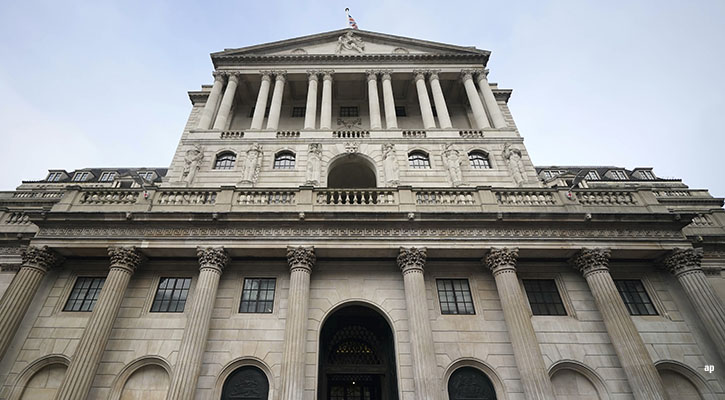
By the time the Bank of England (BoE) announces its monetary policy decision on February 1, two of the world's largest central banks would have already made their decisions.
The European Central Bank already held on January 25, while the Federal Reserve is expected to hold on January 31, having already signalled the "pivot" in December. The BoE's policymakers, while not exactly taking their lead from the ECB and Fed, are expected to keep interest rates on hold at 5.25%.
August 2023 was the last time the Bank made any rate changes and its most recent meeting was on December 13, where the accompanying statement revealed a 6-3 "hold" decision.
"Monetary policy will need to be sufficiently restrictive for sufficiently long to return inflation to the 2% target sustainably in the medium term," it said.
Inflation Not Conquered
Since then, has enough changed in the data to shift the Bank's position on rates?
Inflation ticked up to 4% in December, from 3.9% in November and against consensus forecasts for a fall to 3.8%. While that leaves the Consumer Price Index twice the Bank's target, it's consistent with global trends, particularly in the US and Eurozone, where inflation has gone up again. We will get more precise inflation forecasts in the monetary policy report that accompanies the decision on Thursday, but inflation's return to target in the UK is expected at some point next year.
Reaction to the mid-January inflation print focused on services inflation as an ongoing headache for the BoE. That the data is still giving economists mixed messages.
Guy Foster, chief strategist at RBC Brewin Dolphin, says:
"The critical difference that makes the BoE's job difficult is that services inflation seems to be picking up, which you would normally ascribe to companies passing on higher pay to employees," he says.
"And while wage inflation in the UK has been relatively high, more recently jobs growth has slowed, even turned negative, and pay increases have moderated. So the consumer prices data in December didn't validate the easing that yesterday's employment data was pointing to."
When Will The Bank of England Cut Rates?
James McManus, chief investment officer at Nutmeg, agrees services remain the key.
"For the BoE to be comfortable cutting interest rates – which in turn will bring down mortgage rates and potentially put more money into people’s pockets – it will want to see services inflation as well as headline inflation ease. So it might be too early for a rate cut in February, but expectation is the first half of the year," he comments.
Does the Bank deserve some credit after 14 interest rate hikes? While the government is keen to take the main credit as it heads into an election, inflation has fallen from over 11% to 4%, a significant drop.
At this week's press conference the governor and his colleagues will be keen to stress the "last mile" towards the target will be harder than the drop from double digits to 4%. While the rise in rates from 0.1% in December 2021 to 5.25% in August 2023 has been brutal for mortgage holders coming off fixed rates, the sharp monetary tightening appears to be working. In a sense it would be more alarming if it hadn't. But there's a time lag for rate changes so the medicine will continue to work its way through the system.
For some policy commentators, however, the time lag is reason enough to cut now. Ros Altmann, the former pensions minister ennobled by the David Cameron government, has long highlighted the negative effects of quantitative easing on pension funds. Writing in the Independent in December, she said the Bank had likely gone too far already.
"Monetary policy judgments require a recognition of the time lags between interest rate changes and their economic impact," she wrote.
"These lags are generally considered to be around 12 to 18 months, which means that the impact of rate rises since the fourth quarter of last year are still working through.
"Tighter monetary policy usually means weaker bond and equity markets, which could cause further mayhem for pensions if rates stay too high for too long."
What is The Consensus on Rate Cuts?
External factors shoudl not be ignored either, however, and those include softening food inflation and lower petrol prices. Wage growth, a cause of concern for the Bank, is also moderating. Mortgage rates are starting to adjust downwards in anticipation of rate cuts this year. Last month's inflation uptick was driven largely by alcohol and tobacco prices, which are usually thought of as discretionary spending.
Still, a recent cold snap, combined with the lifting of the Ofgem energy price cap at the start of the year, will have pushed up energy prices again. Unlike in the US, where economic activity is gaining momentum, data suggests the UK remains in the doldrums, so here rate cuts are unlikely to cause the economy to "run hot". Usually adding to cheaper money to an accelerating economy can exacerbate problems such as housing bubbles and people relying too much on credit.
Adam Darling, investment manager, fixed income, at Jupiter Asset Management, says "underlying economic fundamentals in terms of a cooling job market, weak money supply and soft business and consumer confidence suggest that UK inflation should continue to fall and that the Bank should start cutting rates this year".
As part of our 2024 outlook week we collected investment banks' forecasts for UK rate cuts; no doubt these will seem out-of-date very quickly as the year progresses. Goldman Sachs were the most doveish, expecting the first rate cuts in February or March. Now the Factset consensus points to no change until the second half of the year and 50 basis points of cuts to 4.75% by the end of the third quarter.

























